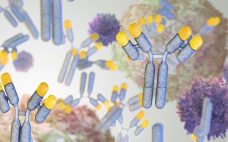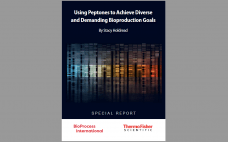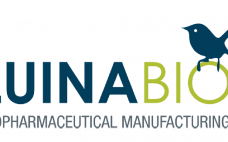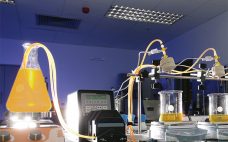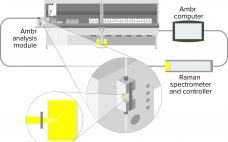Freiburg, Germany-based CellGenix says its T-cell medium – CellGenix TCM – offers a serum-free and xeno-free alternative for rapid expansion of functional human T-cells. Due to stable glutamine in the formulation, the medium is ready-to-use for T-cell cultures without the need for supplementation with human serum or glutamine. Many current T-cell therapy protocols rely on the addition of human serum. Eliminating the use of human serum will reduce the failure rate in your manufacturing process due to the high lot-to-lot…
Sponsored Content
Cell Culture Media Manufacturing, Outsourcing and the Pandemic: An Essential Toolkit
This webcast features: Chad Schwartz, Senior Global Product Manager for Proprietary Cell Culture Media Formulations, and Eric Nalbach, Director of Product Management, Bioproduction, Cell Culture Media, Thermo Fisher Scientific The COVID-19 pandemic has had an unprecedented impact across the bioproduction industry, from supply chains to working practices. As organizations adapt to such changes, they have already experienced huge shifts in how the industry works. Those working in both research and manufacturing feel an obligation to employ all available resources to…
Antibody Internalization: Advanced Flow Cytometry and Live-Cell Analysis Give Rich Insights During Antibody Profiling
The natural characteristics of antibodies, such as high binding affinity, specificity to a wide variety of targets, and good stability, make them ideal therapeutic candidates for many diseases. Therapeutic antibodies, in particular monoclonal antibodies (mAbs), deliver promising therapeutic results in several different disease areas, such as autoimmunity, oncology, and chronic inflammation. Researchers’ abilities to improve the breadth of antibodies have been aided by innovative technologies for antibody discovery, for instance, through humanization of mouse antibodies and phage display. However, advanced…
Using Peptones to Achieve Diverse and Demanding Bioproduction Goals
As bioproduction requirements advance, it is critical to have consistent, high-quality media and supplements that continue to meet evolving industry needs. Peptones have been successfully used in bioproduction applications for more than 30 years to meet diverse and demanding production requirements. Their unique nutritional profiles and usage flexibility make peptones ideal components for creating a robust bioprocess. This Special Report will demonstrate the benefits of peptones and how they can be used to enhance process performance and consistently yield a…
Luina Bio Is Growing Its Service Offerings with New GMP Facility Expansion Plans
Luina Bio, one of Australia’s most experienced biopharmaceutical contract development and manufacturing organizations, has announced plans to open a new good manufacturing practice (GMP) manufacturing suite. The expansion plans include a new small-scale GMP manufacturing suite that is scheduled to open in the fourth quarter of 2020. The suite will complete the company’s service offerings to customers that require small-scale GMP facilities. “This new suite will allow us to respond to those customers that need a smaller active dose for…
Integrated Generation and Characterization of CAR T Cells
Chimeric antigen receptor (CAR) T cell therapies have been approved by the FDA and other global public health agencies to treat B cell leukemias and have seen great clinical success. Autologous CAR T cell manufacturing involves isolating T cells from a patient, activating these cells, introducing an engineered CAR construct, and expanding the cells to a scale appropriate for therapeutic dosing. Patient samples from multiple sources result in inconsistent clinical outcomes and overall product quality. To ensure patient safety and…
Three Ways to Successfully Scale-Up Your Bioprocessing Production
When developing a biopharmaceutical manufacturing process, an R&D or process development team may fall into the trap of developing a process in the lab which is difficult to scale to work with larger volumes in production, leading to delays and costly additional development later on. It is therefore crucial that, where possible, technology is used at small-scale which can be scaled alongside the process in a consistent manner. Taking a thoughtful and strategic approach can help biopharmaceutical products get to…
Accelerating mRNA-Based Therapy Development with Scalable Purification of In Vitro Transcribed mRNA
This webcast features: Kelly Flook, Senior Product Manager, Purification Products, Thermo Fisher Scientific The diversity of potential mRNA-based therapies has led to increased interest in using synthetic mRNA as a tool in the treatment of multiple diseases, such as cancer, stem cell therapies, and infectious diseases. Nevertheless, obtaining larger quantities of synthetic mRNA for clinical treatment remains a challenge. Currently available mRNA purification methods are becoming a bottleneck for large-scale manufacture as the limits of research-scale purification techniques are realized.…
Dissolved Oxygen Control Tuning for Cell Culture Applications
Proper tuning of dissolved oxygen (DO) controller proportional integral (PI) values is essential for optimal cell culture performance in a bioreactor. When DO-PI values are optimized, gas flows are smoothed, and foaming and cell stress are reduced. Traditionally, this tuning has been performed by using nitrogen gas to purge oxygen from a test solution, thus simulating oxygen demand. That method has several drawbacks, however. First, nitrogen gassing cannot simulate the high demands of high-density fermentation. Second, nitrogen competes with other…
Novel Integrated Raman Spectroscopy Technology for Minibioreactors: Accelerating Raman Model Building for Cell Culture Monitoring and Control
Raman spectroscopy is used widely in biomanufacturing as a process analytical technology (PAT) for monitoring analytes such as glucose and lactate (1). Predictive Raman models also can be used to control glucose concentration in cell cultures (2). The technique is becoming more popular for pilot- and manufacturing-scale bioreactors, but it only recently has been studied with minibioreactors for measuring analytes and producing predictive Raman models for feedback control (3) thanks to advances in integrated technology for automating sampling, analysis, and…



